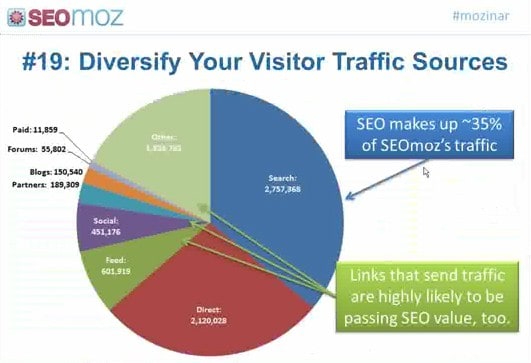
As we discussed with linking domain diversity, diversity is also important to think about when it comes to traffic sources. Relying too heavily solely on search engines for your traffic can lead to huge vulnerabilities when search engines make changes. As SEOmoz'a Rand Fishkin explains traffic source diversity is essential for successful seo:
- Search engines want to reward sites that "naturally" attract traffic from other sources - those who get clicks on the links that point to them, who have social media sharing happening aroud their content and who aren't simply a "farm" for search visits.
- The online world is diversifying at a much greater clip in the last 3 years than anytime since the mid-90's. Instead of consolidation, we're seeing expansion as sites like Reddit, StumbleUpon, Twitter, Facebook, Yelp, YouTube, etc. all expand their reach and newcomers like Foursquare, Path, Quora, StackExchange, Groupon, LivingSocial, and many others become substantive traffic drivers. Sites that can't play in these new ecosystems will likely lose out to their early-adopter-friendly competitors.
- No single source of traffic is wholly "safe," but a diversified portfolio has much less associated risk.
- Diversifying traffic sources means experimenting with new potential channels for traffic, and that means potentially finding sources that send great visits, links, citations, shares, etc.
- Getting to a new channel before a competitor can be key to owning mindshare and traffic from that source.
- Diversification makes it less likely that a road bump in any single channel can have a devasting impact on your overall business. One thing I'm very thankful for is that SEOmoz only gets ~30% of its traffic from Google. Should they ever (intentionally or unintentionally) alter our ability to perform, we won't be dead in the water (unlike many of our peers in similar spaces).
As search engines evolve, so too do the signals that they use to order search results. Recently, there has been a lot of emphasis placed on the importance of social and local signals. I am one that anticipates that user data will, if it isn't already, at some point be used by search engines too. From this perspective, diversifying traffic sources could have an impact on your site's visibility in search results.
Further, Internet users are spending more and more time on "other places online." These include social media & social bookmarking sites. Comprehensive web strategy involves going where the users are going.
Still, the most compelling argument for focusing on diversifying traffic sources are search engine updates. While the Panda Update, is on everyone's mind now, this is not the first time that Google has made a change that had a significant impact on the search results. Putting all of your "web marketing eggs" in the Google basket is very high-risk.

Over the years, law firm prospects have sent us reports from just about all of our competitors. Unfortunately, even today, some law firm marketing agencies still mislead their clients via "reporting." One particularly egregious example comes in the form of ranking reports. Which prompted this LinkedIn post. To my surprise, I received a lot of […]
John Wanamaker supposedly said "Half the money I spend on advertising is wasted; the trouble is I don't know which half." In an an effort to figure out "what half is working," attribution was born. Coupled with a transition from traditional, offline ads to digital media, attribution became the holy grail for analyzing advertising spends. But […]
I recently asked ChatGPT, "What are some of the top personal injury law firms in Chicago?? Actually, first I ask "who are some of the top personal injury lawyers in Chicago?" ChatGPT couldn't handle that one, so I modified the prompt. ChatGPT listed five very well-known firms downtown. Can you guess the other four? That's […]
If you're like me, you have some degree of AI, ChatGBT, Bard, exhaustion. Now don't get me wrong, this is stuff is remarkable and is changing, well, a lot. But before you hook up the ChatGPT API to your WordPress API and crank out 10,000 pages, here are a few things to think about. Let's […]
If you know me, you know my opinions about links and SEO advice from Google. If you don't, here's the TL;DR: Meh, links! Meaning, all things being equal, links still remain a competitive difference maker for ranking. Take Google's SEO advice with several grains of salt. Google has no economic incentive to help your site […]
The best marketing advice I can give you is to be authentic. Of course, you don't find that very helpful in terms of meeting your growth goals. So, you might decide to game the system. As I'm writing this, one of the more popular ways to gain the system is to pay for engagement. This […]
The following post was written by ChatGPT. ChatGPT, developed by OpenAI, is a state-of-the-art language model that can generate human-like text based on a given prompt or context. This technology has the potential to revolutionize the way that businesses, including law firms, market themselves to potential clients. One way that a law firm could use […]
How long does SEO take? When can I expect to see results? What results should I expect to see? These are all reasonable questions that we field from lawyers every day. And, like many legal answers, the answer is: It depends. Yes, I know that's not the answer you wanted. But it's the most honest […]
And how much time should they spend doing it? I recently had the privilege of chatting with Tyson, Jim, and Conrad for an upcoming episode of The Maximum Lawyer Podcast. If you're not familiar with The Maximum Lawyer community, you should definitely check it out. Jim asked a really great question about who should do […]